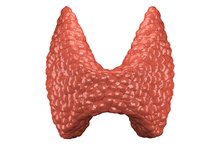What does fact checked mean?
At Healthfully, we strive to deliver objective content that is accurate and up-to-date. Our team periodically reviews articles in order to ensure content quality. The sources cited below consist of evidence from peer-reviewed journals, prominent medical organizations, academic associations, and government data.
The information contained on this site is for informational purposes only, and should not be used as a substitute for the advice of a professional health care provider. Please check with the appropriate physician regarding health questions and concerns. Although we strive to deliver accurate and up-to-date information, no guarantee to that effect is made.
What Does a High TSH Level Mean?
Thyroid-stimulating hormone or TSH is released by the pituitary gland and activates the thyroid gland, which in turn releases two other hormones, T3 and T4. If the thyroid releases less T3 and T4 than normal, the pituitary will increase production of TSH.
The TSH Test
TSH refers not only to the hormone, but also to the test used to measure levels. Results of the simple and routine blood test to measure TSH levels should arrive in just a day or two after having blood drawn.
The Normal Range
What Is Considered a Low TSH Level?
Learn More
Normal ranges of TSH vary depending on whether the patient is already being treated for a thyroid condition. According to the National Institutes of Health, the normal range for those who are untreated for a thyroid condition is between 0.4 and 4.0 mlU/L, while the range is between 0.5 and 3.0 mlU/L for those already being treated for a thyroid condition.
High TSH
If TSH levels measure above the normal range, a doctor may diagnose the condition as hypothyroidism. Hypothyroidism can be caused by inflammation or infection of the thyroid or can be the result of a damaged thyroid gland or pituitary gland 2.
Symptoms of Hypothyroidism
What Does Low TSH Level Mean?
Learn More
Treatment of Hypothyroidism
The most common treatment for high TSH levels is through synthetic TSH administered daily in pill form. In cases where hypothyroidism is caused by a tumor on the pituitary gland, treatment may include surgery and removal of the growth.
Related Articles
References
- Medline Plus: TSH
- Mayo Clinic: Hypothyroidism (Underactive Thyroid)
- Sheehan MT. Biochemical Testing of the Thyroid: TSH is the Best and, Oftentimes, Only Test Needed - A Review for Primary Care. Clin Med Res. 2016;14(2):83-92. doi:10.3121/cmr.2016.1309
- Stagnaro-green A, Abalovich M, Alexander E, et al. Guidelines of the American Thyroid Association for the diagnosis and management of thyroid disease during pregnancy and postpartum. Thyroid. 2011;21(10):1081-125. doi:10.1089/thy.2011.0087
- Chaker L. Hypothyroidism. Lancet. 2017 Sep 23;390(10101):1550-1562. doi:10.1016/S0140-6736(17)30703-1
- Mcmillan M, Rotenberg KS, Vora K, et al. Comorbidities, Concomitant Medications, and Diet as Factors Affecting Levothyroxine Therapy: Results of the CONTROL Surveillance Project. Drugs R D. 2016;16(1):53-68. doi:10.1007/s40268-015-0116-6
- De Leo S. Hyperthyroidism. Lancet. 2016 Aug 27;388(10047):906-918. doi:10.1016/S0140-6736(16)00278-6.
- Ross DS. 2016 American Thyroid Association Guidelines for Diagnosis and Management of Hyperthyroidism and Other Causes of Thyrotoxicosis. Thyroid. 2016 Oct;26(10):1343-1421. doi:10.1089/thy.2016.0229
- Koulouri O, Moran C, Halsall D, Chatterjee K, Gurnell M. Pitfalls in the measurement and interpretation of thyroid function tests. Best Pract Res Clin Endocrinol Metab. 2013;27(6):745-62. doi:10.1016/j.beem.2013.10.003
- Nair R, Mahadevan S, Muralidharan RS, Madhavan S. Does fasting or postprandial state affect thyroid function testing?. Indian J Endocrinol Metab. 2014;18(5):705-7. doi:10.4103/2230-8210.139237
- Hofman LF, Foley TP, Henry JJ, Naylor EW. The use of filter paper-dried blood spots for thyroid-antibody screening in adults. J Lab Clin Med. 2004;144(6):307-12. doi:10.1016/j.lab.2004.09.009
- Barbesino, G. Thyroid Function Changes in the Elderly and Their Relationship to Cardiovascular Health: A Mini-Review. Gerontology. 20 July 2018:1-8.
- Favresse, J., Burlacu, M., Maiter, D., and D. Gruson. Interferences With Thyroid Function Immunoassays: Clinical Implications and Detection Algorithm. Endocrine Reviews. 2018. 39(5):830-850.
- Srichomkwun, P., Scherberg, N., Jaksic, J., and S. Refetoff. Diagnostic Dilemma in Discordant Thyroid Function Tests Due to Thyroid Hormone Autoantibodies. AACE Clinical Case Reports. 2017. 3(1):e22-e25.
- Braverman, L, Cooper D. Werner & Ingbar's The Thyroid, 10th Edition. WLL/Wolters Kluwer; 2012.
Writer Bio
Liz Eubanks has been working as a writer and health researcher since 2006. Eubanks has a master's degree in social work and Bachelor of Arts degrees in international studies, Latin American studies and Spanish. Additionally, Eubanks has worked as a licensed massage therapist, has a certificate in holistic nutrition and is a devout yogi.







